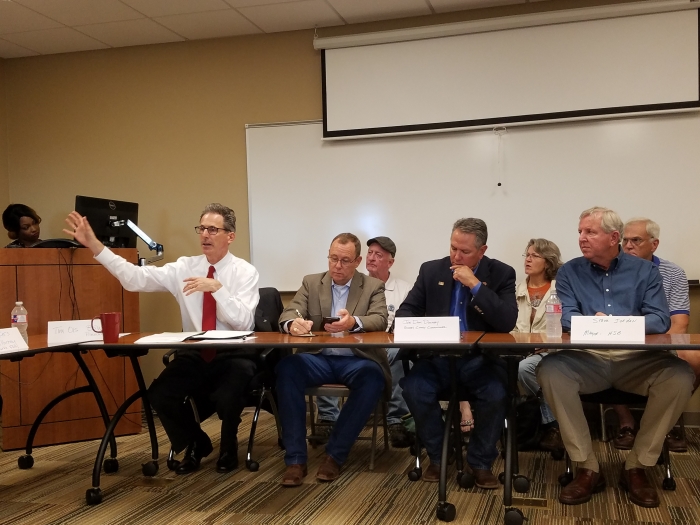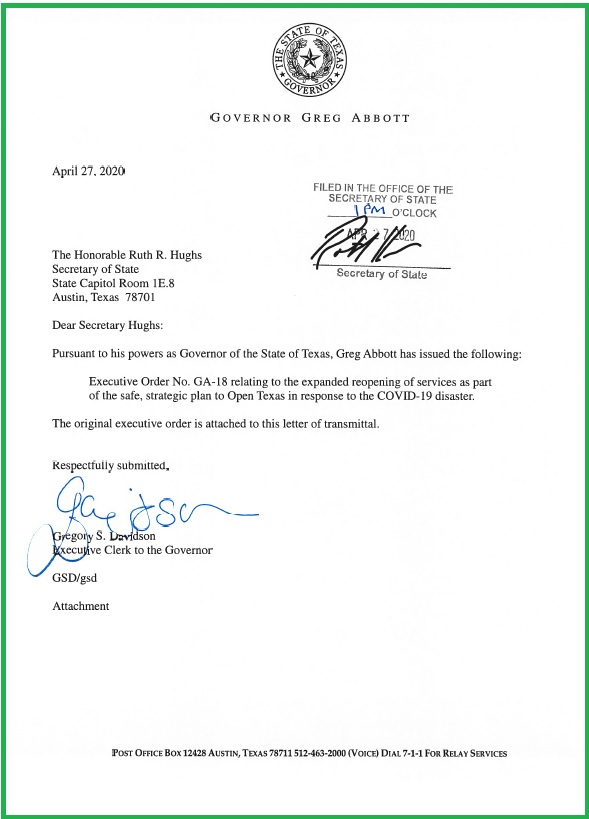Stakeholders come together to oppose rock crushing plant

Lew K. Cohn/The Highlander
Baylor Scott & White Hill Country Region president Tim Ols, left, speaks about the impact a proposed rock crushing plant would have on the hospital campus in Marble Falls as state Rep. Terry Wilson, Precinct 4 County Commissioner Joe Don Dockery and Horseshoe Bay Mayor Steve Jordan listen Friday during a meeting at the BSW Specialty Clinic training room. Stakeholders from a wide spectrum of interests came together in opposition of the proposed Asphalt Inc. rock crushing plant, which has an air quality permit before the Texas Commission on Environmental Quality.
By Lew K. Cohn
Managing Editor
The Highlander
Homeowners, ranchers, government officials, hospital leaders and concerned citizens met together Friday at Baylor Scott & White Speciality Clinic with one common goal in mind — opposing the construction of a new rock crushing plant south of Marble Falls.
Asphalt Inc. applied for an air permit from the Texas Commission on Environmental Quality (TCEQ) to operate a new rock and concrete crushing plant with an entrance 90 feet west of US 281 and approximately 2.6 miles south of the intersection of Texas 71 near Flat Rock Road, which is Burnet County Road 403.
Concerned parties have until Oct. 9 to submit comments, questions and concerns to TCEQ in hopes of convincing the agency to hold a contested case hearing on the permit request. Written public comments about the application may be submitted to: Texas Commission on Environmental Quality, Office of the Chief Clerk, MC-1-5, P.O. Box 13087, Austin, TX 78711-3087, or electronically at tceq.texas.gov/about/comments.html.
Friday's meeting was facilitated by Tim Ols, president of Baylor Scott & White Health Hill Country Region, who brought together stakeholders from a wide spectrum of interests to discuss the impact the proposed plant would have.
“We are all here to do what we can to keep a rock-crushing plant from making a negative difference in our community,” Ols said.
Ols said on a daily basis, Baylor Scott & White Marble Falls has around 1,000 people on its campus, which includes employees as well as customers receiving inpatient, outpatient and emergency care. At least 70 patients every day who come onto campus are classifieds as “cardiopulmonary” patients who have heart and lung issues, so “dust would be a challenge for them and make a big difference in what they are able to do about their health.”
Additional dust and particulates in the air from a plant located less than a mile away would severely challenge the hospital's filtration and evaporation systems, causing system damage and endangering the health of patients, Ols said.
Marble Falls mayor John Packer said the city has spent millions of dollars to extend infrastructure south of town in an effort to attract new housing developments and new business, with Baylor Scott & White's location being a major selling point and hub for that growth.
“Having a quarrying and crushing facility in that area would completely change the face of development in that area,” Packer said. “Homeowners are not going to want to live right next to a rock quarry and crushing operation. The developers will not be able to sell any houses out there.”
Packer said Marble Falls City Council is expected to take action at Tuesday night's regular council meeting on an ordinance announcing the city's intent to annex 1,242 acres of land southwest of the city limits, beginning at the western boundary of the Gregg Ranch development, which was annexed into the city in 2015.
The land to be annexed includes 513 acres of the Hohenberger ranch, 332 acres of Creighton Ranch LLC, 272 acres of the Schieffer Ranch and 101 acres of Dowd Ranch LLC, as well as right-of-way along both Texas 71 and US 281.
Annexing this land currently in the city's extraterritorial jurisdiction (ETJ) would then extend the city's ETJ to include the proposed plant site, making it subject to city ordinances regarding subdivisions, signs and water quality, said assistant city manager Caleb Krenzel. Land immediately to the east of the proposed plant site primarily would be zoned Neighborhood Residential.
“Once they meet all of our ordinances, we would be legally obligated to give them a permit, but annexing property in our ETJ might slow this down or, at least, create layers of obligations that this company would have to meet first,” Krenzel said.
County Judge James Oakley said Burnet County does not support the application, but if it were to be approved, he would work with the Texas Department of Transportation (TxDOT) to ensure that agency “does all it can to ensure acceleration and deceleration lanes are in place, as well as turn lanes at the entrances to the property.”
Precinct 4 Commissioner Joe Don Dockery said he already has reached out to the TxDOT district engineer in Austin to make them aware of the proposed plant. He also has spoken with the Central Texas Groundwater Conservation District and learned there are two wells on the plant site which are not outfitted for industrial use, so the company would have to go through permitting with the conservation district if it chooses to use those wells.
Grant Dean of the Cactus Companies, who lives in The Overlook subdivision, due west of the proposed plant site, said Austin environmental attorney Brian Sledge has been retained to represent himself and other property owners in the vicinity. Sledge was previously successful in helping Burnet County resident Paul King and other members of the Texas Hill Country Property Rights Coalition prevent an unwanted quarry expansion at the Oldcastle Materials property north of Marble Falls last year.
Dean expressed his concern that not only would the quarry and rock crushing plant be “a negative impact for anyone,” but questioned the true location of where the operation would be due to where available rock is located.
“There is no rock there along US 281,” Dean said. “Most of the rock in the area starts north of there. Eventually, they would be within 1,000 feet of the hospital. Every day would see them closer and closer to the hospital. They are being deceptive about their location.”
Marble Falls city attorney Patty Akers told neighboring landowners present that they would have “the most direct standing” when it comes to opposing the permit application.
“It will be critical for the adjacent property owners to put in their protest letters and to show the adverse impact this operation would have on you,” she said. “A contested case hearing is going to be the best way to attach the technical merit of the permit application and it is very difficult to get TCEQ to give you one, so that is why it is so crucial you get your information about the impact this will have on you on the application, so you can have standing as being adversely affected.”
State Rep. Terry Wilson, R-Marble Falls, said he expects to receive a letter from the pro-aggregates lobby after word gets out about his involvement in the meeting.
“I will have a letter about the positive aspects of this business and how they buy supplies and will employ 90 people locally,” Wilson said. “They have one of the strongest lobby groups in the state of Texas.
“I am pro-business, but those businesses must be responsible to the county they do business in. There are no taxes on aggregates and there is very little revenue generated from a business like this to the county other than the ad valorem taxes.”
Ols and Soc Gonzalez of the Citizens for Scenic Texas Highways, which has put in a large-scale gateway beautification project at the intersection of US 281 and Texas 71, will get word out to interested parties about the next meeting for this group of stakeholders to organize their efforts to oppose the proposed plant.






